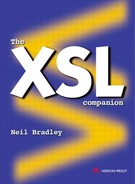Forward compatibility
XSLT processors developed to support XSLT version 1.0 should be able to cope with stylesheets developed to conform to a later version of this standard. When the stylesheet contains a Version attribute with a value other than '1.0', the processor should adopt a 'forwards-compatible' mode to help it cope with unexpected features.
When the processor has adopted this mode, it is given permission to ignore any top-level elements that it does not recognize:
<xsl:stylesheet version="1.3"> <xsl:import.../> ... <xsl:new-feature /> <!-- 1.0 processors IGNORE --> ... <xsl:template>...</xsl:template> ... </xsl:stylesheet>
Also, any unexpected elements appearing within a template do not cause an error. It is possible to step over such elements by testing the version of XSLT that the processor understands. The system-property() function can be used to request the supported version number by passing the parameter value 'xsl:version' to it (as described in Chapter 20). The return value can then be compared with the version that supports the feature:
<xsl:template>
<xsl:if test="system-property('xsl:version') >= 1.2">
<xsl:new-template-feature />
</xsl:if>
...
</xsl:template>
Alternatively, the 'fallback' feature described above can be used:
<xsl:template>
<xsl:new-template-feature>
<xsl:fallback>...</xsl:fallback>
</xsl:new-template-feature>
...
</xsl:template>
Finally, unknown attributes are simply ignored.
